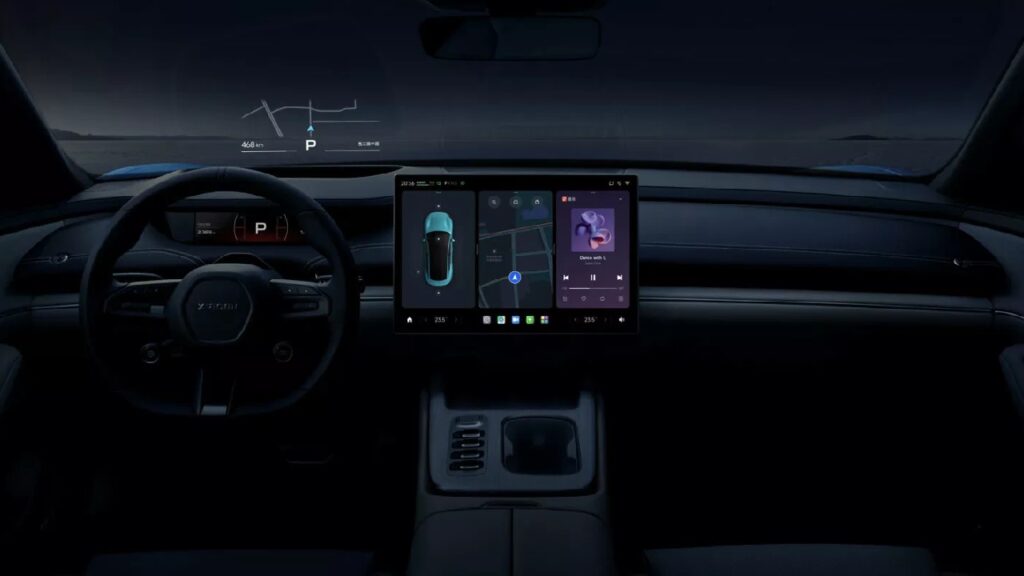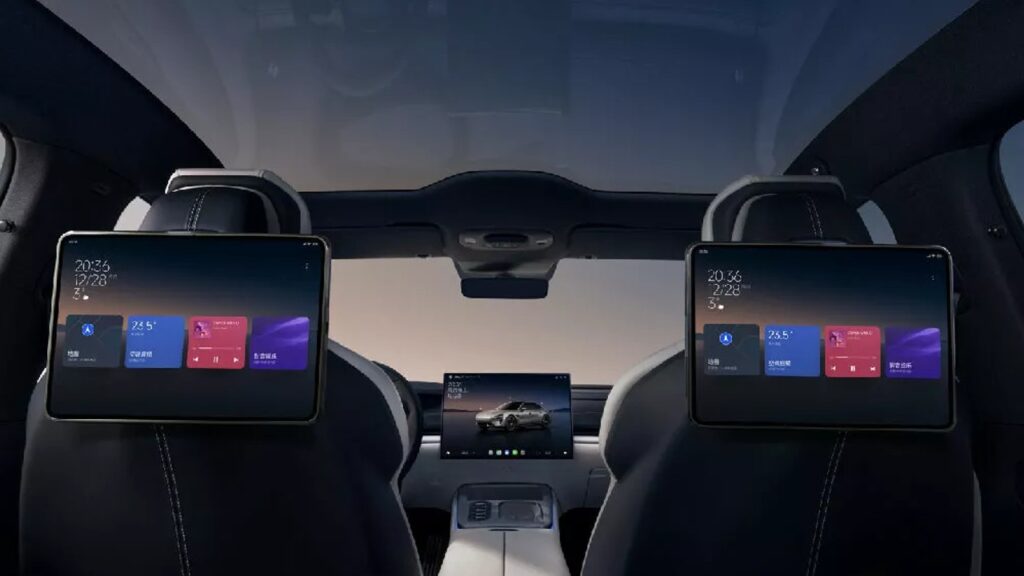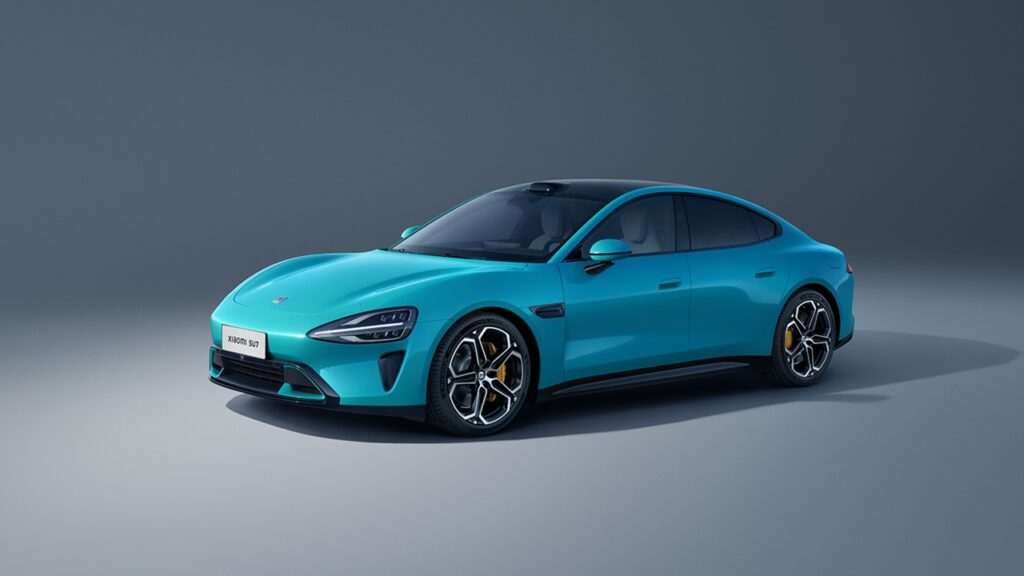Within just 27 minutes of the launch, Xiaomi received a whopping 50,000 bookings for the EV!
The Chinese tech giant has finally launched the promising Xiaomi SU7 EV, undercutting the Tesla Model 3. The SU7 retails for an enticing 215,900 Yuan (approx. $30,000), while the Tesla Model 3 starts at 245,900 Yuan (approx. $34,000). Xiaomi CEO Lei Jun confirmed that in order to price it competitively, each SU7 will be sold at a loss. That highlights just how severe the situation is in the Chinese market. Furthermore, he mentioned that due to the automation of critical processes in its manufacturing plant, the company can produce an SU7 every 76 seconds!

You might also like: All Winners At 2024 World Car Awards – Kia EV9 To BMW i5
Xiaomi SU7 EV Launched – Specs
The HyperEngine V8s sets a global record for EVs, achieving a maximum speed of 27,200 RPM, 425 kW (570 PS) output, and 635 Nm peak torque. To surpass the industry standard of 27,200 RPM, the HyperEngine V8s employs the industry’s first ultra-high-strength silicon steel plate with a tensile strength of 960 MPa.
Regarding cooling design, the HyperEngine V8s integrates Bidirectional Full Oil Cooling Technology and an S-shaped oil circuit design. A dual-cycle oil circuit increases the heat dissipation area of the stator by 100%, resulting in a cooling effect of up to 20°C. The rotor section employs a patented S-shaped oil circuit, enhancing the heat dissipation area by 50% and achieving a cooling effect of up to 30°C. Additionally, the stator silicon steel laminations feature a “step-like” staggered design, further increasing the effective heat dissipation area by an additional 7%. The HyperEngine V8s is currently under development and is slated for mass production and implementation in Xiaomi EVs in 2025.
Xiaomi’s self-developed HyperEngine V6/V6s E-motors boast an industry-leading rotational speed of 21,000 RPM, surpassing the most powerful mass-produced electric motor globally. The HyperEngine V6 super motor delivers a maximum power of 299 PS and a maximum torque of 400 Nm. Conversely, the HyperEngine V6s super motor achieves a maximum power of 374 PS and a maximum torque of 500 Nm.
| Specifications | Xiaomi SU7 |
| HyperEngine V8s | 570 PS / 635 Nm |
| HyperEngine V6 | 299 PS / 400 Nm |
| HyperEngine V6s | 374 PS / 500 Nm |
| HyperEngine V8s Max Speed | 27,200 RPM |
| HyperEngine V6 / V6s Max Speed | 21,000 RPM |
| Acceleration (0-100 km/h) | 2.78 seconds |
| Top Speed | 265 km/h |
You might also like: Mercedes-Benz GLC 350e PHEV Announced w/ DC Fast Charging

Xiaomi SU7 EV Battery Tech
Xiaomi has spearheaded the advancement of CTB Integrated Battery Technology by leveraging innovative Inverted Cell Technology, a versatile elastic interlayer, and a streamlined wiring system. This technology achieves an impressive battery integration efficiency of 77.8%, the highest among CTB batteries globally. It results in an overall performance enhancement of 24.4% and reduces height by 17 mm. With a maximum battery capacity of up to 150 kWh and a theoretical CLTC recharge range exceeding 1200 km, Xiaomi’s CTB Integrated Battery Technology establishes a new industry benchmark.
In light of safety considerations, this battery incorporates a 14-layer physical protection system consisting of 3 top layers, 3 side layers, and 8 bottom layers. With an improved heat dissipation system, the battery can withstand temperatures of up to 1000°C. To effectively control and monitor the entire battery unit, Xiaomi provides a self-developed Battery Management System (BMS) with ASIL-D certification.
| Battery Details | Xiaomi SU7 |
| Capacity (Max) | 150 kWh |
| Range (CLTC) | 1,200 km |
| Type | Inverted Cell Technology |
| Battery Integration Efficiency | 77.8% |
You might also like: Kia EV6 Facelift Spotted Testing – Everything We Know So Far

Features and Autonomous Driving Tech
The Xiaomi SU7’s cabin exudes ultra-modernity and is packed with cutting-edge technology. It features a 16.1-inch 3K central console, a 56-inch HUD (Head-Up Display), and a 7.1-inch rotating dashboard equipped with two seat-back extension mounts for connecting two tablets. To ensure seamless operation across devices and applications, the SU7 utilizes the Snapdragon 8295 in-car chip, offering AI computing power of up to 30 TOPS. Connecting almost any smart device to the vehicle takes just a matter of seconds, enabling the Human x Car x Home Smart ecosystem.
In terms of active safety capabilities, the SU7 is equipped with two NVIDIA Orin high-performance chips, boasting a total computing power of 508 TOPS, along with 1 LiDAR, 11 HD Cameras, 3 Millimeter-Wave Radars, and 12 Ultrasonic Radars. Xiaomi’s fully-developed in-house intelligent Autonomous Driving system is poised to revolutionize the industry as early as 2024.

You might also like: Key Highlights Of The BMW Vision Neue Klasse X Revealed
Learn Electric Cars Says
As fresh contenders emerge on the global EV scene, the landscape becomes increasingly intriguing. The EV revolution has spurred a wave of new startups and cross-industry players eager to venture into this burgeoning field. Notably, companies like Sony and Apple have already announced plans to introduce their electric cars in the future. As EVs become more focused on electronics, these tech giants can capitalize on their decades of experience in consumer electronics.
Through strategic partnerships, they have the potential to challenge traditional automakers moving forward. Amidst this evolution, customers stand to gain the most, as they will have access to quality products at competitive prices. The Xiaomi SU7 exemplifies how electronic firms have made significant strides, with its impressive battery, range, e-motors, and technological features.


Pingback: Tesla Clocks 6 Million Lifetime Sales, 1 Million In Last 6 Months
Pingback: Geissele Products
Pingback: Ford Everest
Pingback: เว็บพนัน auto ต้อง LSM99
Pingback: เว็บพนันแทงบอล ออนไลน์ lsm99day
Pingback: บอลเต็ง
Pingback: ปั้มคนดูไลฟ์สด
Pingback: Jun88 เว็บพนันออนไลน์
Pingback: MLM
Pingback: ไฟสนามกีฬา
Pingback: แจกสูตรบาคาร่า เชื่อถือได้ กับ เว็บบาคาร่า ไม่มีขั้นต่ำ LSM99
Pingback: รีวิวเกมสล็อต ค่าย PG SLOT
Pingback: Vox Casino
Pingback: rich89bet
Pingback: ไซด์ไลน์
Pingback: Chicken Road
Pingback: tokped777
Pingback: ตู้คอนเทนเนอร์เย็น
Pingback: ufabet777
Pingback: mostbet indir
Pingback: thc gummies uk
Pingback: Aviator
Pingback: Play Crazy Time game in the UK
Pingback: รับดูแลผู้ป่วย
Pingback: fox888
Pingback: Angthong National Marine Park
Pingback: Go X Scooters New Orleans
Pingback: Buy Villa Phuket
Pingback: เด็กเอ็น
Pingback: ดูหนังออนไลน์ฟรี
Pingback: รับจด อย